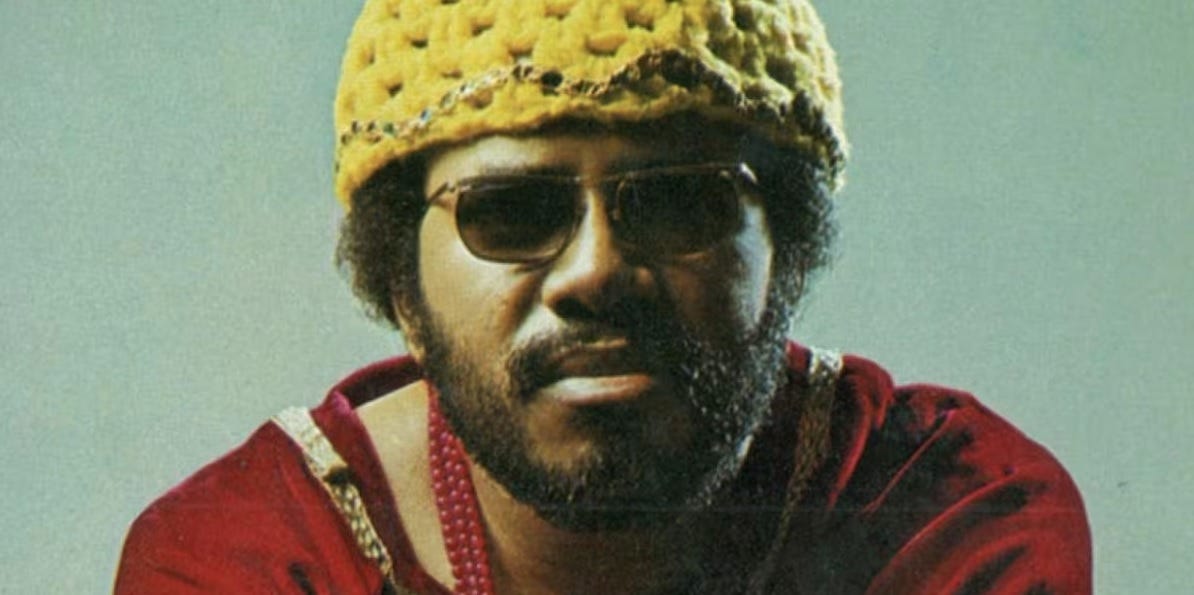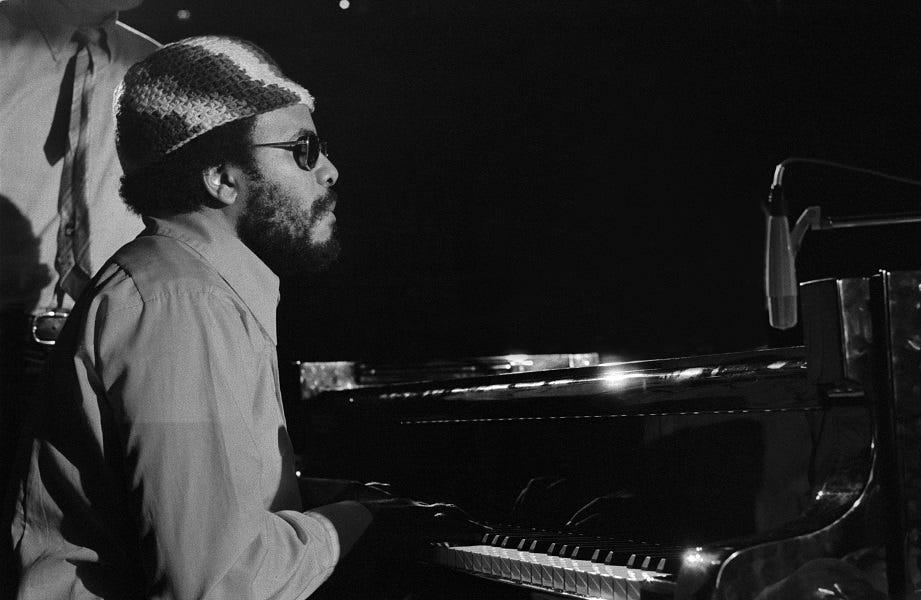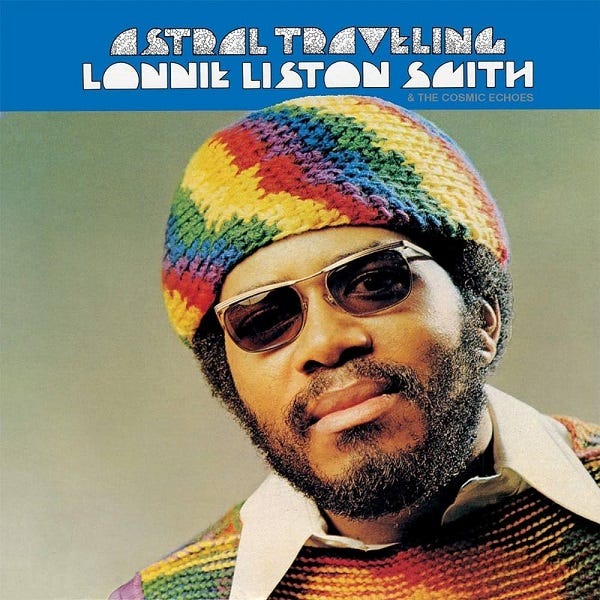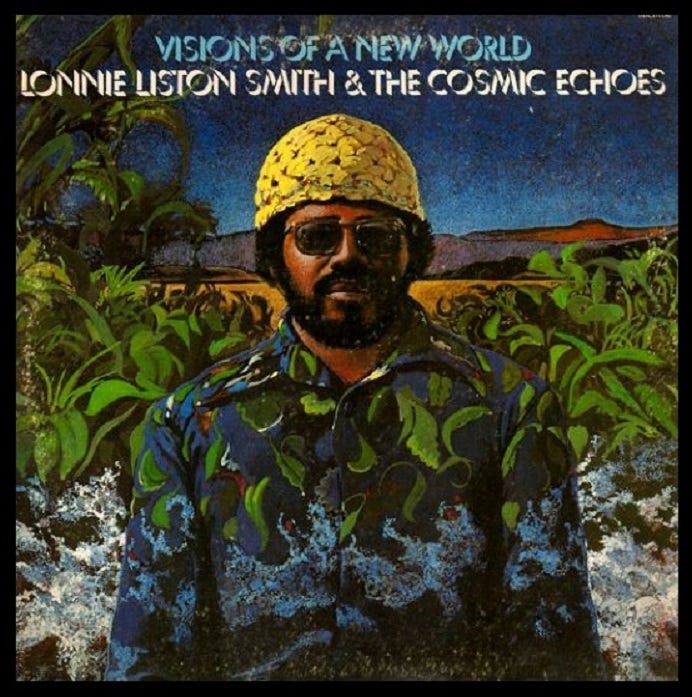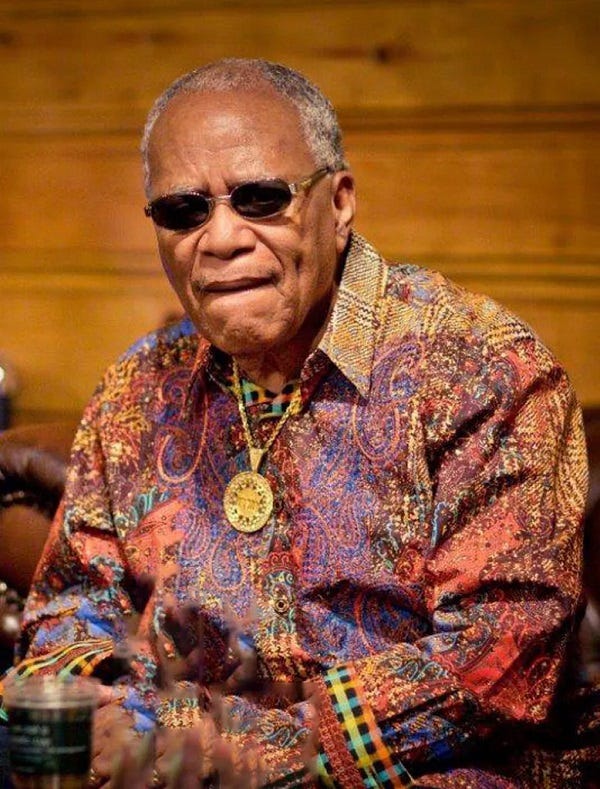Lonnie Liston Smith (born December 28, 1940) – Give Peace A Chance (Make Love Not War) (1980)
The cosmic jazz-funk legend re-worked his epic 1975 message song A Chance For Peace into this even more phenomenal disco-funk dancefloor anthem.
View most updated version of this post on Substack.
Open YouTube playlist of all songs in this post.
The living legend Lonnie Liston Smith is a master keyboardist who began his jazz career in the early 1960s and went on to play with giants including Roland Kirk, Art Blakey, Pharoah Sanders, and Miles Davis. In the early 70s he formed his own group the Cosmic Echoes and released several albums that became jazz-funk and acid jazz classics, packed with socially conscious lyrics as he attempted to fulfill a self-described mission to “expand the consciousness of humanity.”
Born and raised in Richmond, Virginia, Lonnie Liston Smith Jr.’s father was a member of the Richmond-based gospel group The Harmonizing Four. The Soul Stirrers with a young Sam Cooke were among the regular musical guests at their house while Smith was growing up. He learned to play piano at a young age, and studied it along with trumpet and tuba in high school and college, graduating from Morgan State University in Baltimore in 1961 with a degree in music education. Smith played with saxophonist Gary Bartz in Baltimore before moving to New York City in 1963.
He joined Roland Kirk’s band in early 1965, and later that year became a member of Art Blakey’s Jazz Messengers, one of several pianists in the group including Keith Jarrett. In the spring of 1966, he left to resume working with Kirk on his Now Please Don't You Cry, Beautiful Edith LP (1967) for Verve, and was replaced by Chick Corea. Smith then played with Max Roach for a year.
In 1968, Smith joined the group Pharoah Sanders had formed after John Coltrane’s death the year before. He played on several of Sanders’ most highly regarded albums, including his masterpiece Karma, recorded in May, 1969 which consisted almost entirely of the epic, nearly 33-minute long jam “The Creator Has a Master Plan.”
Smith’s piano was prominently featured on the prayer for peace “Hum Allah Hum Allah Hum Allah” that opened Sanders’ next album Jewels of Thought, recorded on October 20, 1969 and released at the very end of that year.
On November 15, 1970, during the initial recording session for Thembi, the last album they recorded together, Smith discovered the Fender Rhodes electric piano for the first time. He immediately composed the album’s stellar opening cut “Astral Travelling.” In a 2007 interview, Smith recalled how it happened:
“We got to the studio in California — Cecil McBee had to unpack his bass, the drummer had to set up his drums, Pharoah had to unpack all of his horns. Everybody had something to do, but the piano was just sitting there waiting. I saw this instrument sitting in the corner and I asked the engineer, 'What is that?' He said, 'That's a Fender Rhodes electric piano.' I didn't have anything to do, so I started messing with it, checking some of the buttons to see what I could do with different sounds. All of a sudden I started writing a song and everybody ran over and said, 'What is that?' And I said, 'I don't know, I'm just messing around.' Pharoah said, 'Man, we gotta record that. Whatcha gonna call it?' I'd been studying astral projections and it sounded like we were floating through space so I said let's call it 'Astral Traveling.' That's how I got introduced to the electric piano.”
From 1971-73, Smith joined Gato Barbieri's band and played on several albums with him. In 1972, he also joined Miles Davis’ band, and appeared on his classic fusion LP On The Corner (1972). Interviewed in the early nineties, Smith remembered playing with Davis for the first time:
“The first Miles recording session I went to was with Herbie Hancock and another guy, and it was three keyboards, so I assumed that we were all supposed to play at different times. I'd never played with more than one keyboard before in my life, but Miles, he was like 'What the fuck are you waiting for?'. So he had three keyboard players, and we all played at once. You've got to listen, 'cos you can't get in one another's way. It was a good challenge, doing things you normally wouldn't do. But then of course that makes you stronger. If you notice, everyone that left Miles' band formed their own band, 'cos when Miles got through with you you'd been through it all!”
Smith re-recorded his own version of “Astral Traveling” in 1973, which became the title track to his solo debut album (with his backing band billed as The Cosmic Echoes) released later that year on Bob Thiele’s Flying Dutchman Records. It also contained his version of another track he had previously released with Sanders, the spiritual masterpiece “Let Us Go into the House of the Lord,” which Smith had originally adapted from the title track to the Edwin Hawkins Singers’ 1968 debut album. It was included on Sanders’ 1970 LP Deaf Dumb Blind (Summun Bukmun Umyun).
Astral Traveling’s other highlights were the Middle Eastern-flavored “In Search of Truth” and the beautiful closing cut “Aspirations.” Its all-star lineup included Joe Beck on guitar and James Mtume on percussion. Bassist Cecil McBee played alongside Smith in Sanders’ group from 1969-71, and would go on to appear on several more albums with Smith. Saxophonist George Barron would also become an integral part of the Cosmic Echoes.
Smith’s next album Cosmic Funk (1974) featured his brother Donald on vocals (who sadly passed in 2022), beginning with its powerful title track in which he announced to the world it was time for world peace. It also included the stellar, hypnotic jam “Sais (Egypt),” written by Mtume, and the beautiful peace song “Peaceful Ones,” with Donald on vocals delivering a profound message about how things could be:
“Peace to all mankind, love will guide our hearts and minds, joy will reign throughout the world.”
Cosmic Funk saw drummer Art Gore and percussionist Lawrence Killian come onboard for their first of several LP’s with Smith.
Smith’s third LP with the Cosmic Echoes was his breakthrough Expansions (1975). Recorded in late November, 1974, it was released the following year and quickly became a jazz-funk classic, particularly popular in the UK. Two decades later, Smith recalled how it was a key record on the growing British jazz-funk scene:
“That's what impressed me when I first came over [to the UK] in 1975, to see kids of 12, 13, 14 actually dancing to 'Expansions', really getting into it. ... I had an idea in mind that I wanted to use contemporary rhythms. What happens is that every ten years the rhythm changes, 'cos each generation has its own concept of rhythm and beat. So I was using the rhythms of then, and the kids were dancing to it. But on top of that I wanted to make sure that the other part was meaningful. So, for instance, the kids can dance to 'Expansions', and then they can hear some guy really doing some improvisation on top.”
Besides its masterpiece title track, the album also featured the stellar, spaced-out jam “Shadows” and the beautiful closing cut “My Love.” The Cosmic Echoes lineup on Expansions consisted of Donald Smith on flute and vocals, McBee on bass, Gore on drums, and Killian on congas and percussion, plus Dave Hubbard on saxes and alto flute, Leopoldo Fleming on bongos and percussion, and Michael Carvin on percussion, clavinet, and drums.
See our earlier post on Smith’s 1975 LP Visions Of A New World for more on his follow up album to Expansions.
After seeing the popularity of his music among jazz-funk dancers in UK nightclubs, Smith concocted even more dancefloor-friendly rhythms for his 1976 LP Reflections of a Golden Dream. Its opening cut “Get Down Everybody (It's Time for World Peace)” blended disco, jazz and funk into a potent elixir with a socially conscious message.
Other highlights included the funky message song “Peace & Love” and the epic, laid back jam “Golden Dreams.”
Smith’s dancefloor excursions continued to bloom on his 1978 album Loveland, his first for Columbia Records after switching labels from RCA/Flying Dutchman. The album was solid from start to finish, with standouts like the superb opening cut “Sunburst” (written by guitarist Ronald Dean Miller who would later put together Raw Silk featuring Jessica Cleaves), the upbeat “Bright Moments,” written by Smith, and the epic closing cut “Explorations,” which he co-wrote with saxophonist Dave Hubbard. Smith co-produced Loveland with the legendary Bert DeCoteaux, who also arranged its strings and horns.
For his 1980 LP Love Is the Answer, his last for Columbia, Smith re-worked his epic message song “A Chance For Peace” (1975) from Visions Of A New World into the even more phenomenal disco-funk masterpiece “Give Peace A Chance (Make Love Not War).” It featured Hubbard on sax, Killian on congas and bongos, Pee Wee Ford on bass, Abdul Wali on guitar, James “Crabbe” Robinson on lead vocals, and Gloria Jones of “Tainted Love” fame as one of its backing vocalists.
Happy Birthday to the great cosmic traveler Lonnie Liston Smith.
Further info:
“Rhodes Scholar: Lonnie Liston Smith,” by Simon Trask, Music Technology, May 1993.
“Lonnie Liston Smith: Cosmic Jazzman,” interview by Jim Newsom, April 3, 2007.
“The Interview Series: Lonnie Liston Smith,” Audiophile Style, November 16, 2022.
“The return of jazz-funk keyboardist Lonnie Liston Smith,” The Guardian, May 5, 2023.
“‘I'm cosmic’: Lonnie Liston Smith experiences a revival of interest in his music,” interview by Pat Prescott, WBGO, July 5, 2023.
#soul #funk #jazz #disco #PharoahSanders #LonnieListonSmith



